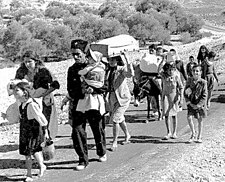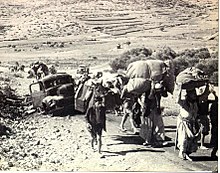Nakba
 |
| Part of a series on the |
| Nakba |
|---|


Nakba or Al Nakba (Arabic: النكبة) (“disaster ” or “catastrophe” in Arabic) is the term commonly used for the Palestinian Catastrophe, an event in the then-recently founded State of Israel, that happened to the Palestinians in 1948. Jewish militia forces that later became the Israeli army, conducted a major operation affecting the local Palestinian Arab population during the1947–1949 Palestine war. Over 500 Arab-majority towns and villages were depopulated, with many of these being either completely destroyed or repopulated by Jewish residents and given new Hebrew names. Approximately, Half of Palestine's previous Arab population, 750,000 people, fled from their homes or were removed forcefully by Zionists.[1] The actions resulted in the massacres, fleeing, or driving out of a majority of Palestinian Arabs from historic Palestine and subsequently the State of Israel. Those who were displaced now live in the occupied West Bank, the Gaza Strip and neighbouring Arab states. In addition, thousands of Palestinians were killed and injured during this period of conflict.[2]
Historical context
The early decades of the 20th century brought a profound change in the Middle East. A massive immigration of Zionists occurred after the Balfour Declaration drafted by Great Britain during World War I. They wanted to settle in Palestine with the intention of founding a Jewish State. Both the surrounding countries and the Arab indigenous populations of Palestine resisted the mass immigration that was arising in their area. This resulted in a heavy dispute between the Zionists and the Arab folks in Palestine. After years of conflict the British government demanded the United Nations to formulate a solution for the situation that took place in Palestine. The plan to divide Palestine into separate Arab and Jewish states was rejected by Arab leaders, they denied any compromise.
Throughout the negotiations the Palestinian Arabs lacked effective leadership. On top of that the disorder intensified when the independence of the state of Israel was announced by David Ben-Gurion on May 14, 1948. The British ended the mandate over Palestine on May 15, 1948.[3]
Palestinian vs Israeli point of view
Up to the present day, Palestinian and Israeli people have a contrasting perspective on the Palestinian catastrophe, the Nakba. Both sides have experienced the historical events differently, which caused a dispute till the 21st century.
Palestinian perspective
The Palestinians often see the Nakba as a dramatic and sad event in the history of the state of Palestine. They see themselves as sufferers of Israeli aggression in their country. Many Palestinians think that they had to suffer because of the Holocaust, while they were not involved in this genocide.[4]
In the Palestinian point of view, the fugitives in 1948 were expelled by jewish aggression based on ethnicity.[5]
Israeli perspective
The state of Israel and its supporters mostly reject the description of the events of 1948 as a "catastrophe" (the Arabic meaning of the word Nakba). Many of them see it as a "fight for independence" and a legitimate response to the Holocaust during World War II. The Israelis see the Nakba as a development of a new state: Israel. Supporters of Israel often say that the Palestinians fled the country by their own decisions and not because of ethnic cleansing by Zionists.[4][6] Unlike the the Palestinian viewpoint, the Israeli viewpoint does not recognize or denies the depopulation of Arab villages and destruction of Palestinian homes. Instead, supporters of Israel use terms such as "abandoned" property and "population exchange" rather than "confiscated" or "expelled."[7][8]
Aftermath
The result of the Nakba was a wave of Palestinian fugitives inside Palestine & Israel, but also to neigbouring countries. The UNRWA (The United Nations Relief and Works Agency for Palestine Refugees in the near East) stated that there were 520.000 Palestinian refugees in 1948.[5]
The amount of refugees from Palestine increased significantly as shown in the table below.[9]
| West bank | Gaza Strip | Jordan | Syria | Lebanon | Total | |
|---|---|---|---|---|---|---|
| RRs 1950 | - | 198,227 | 506,200 | 82,194 | 127,600 | 914,221 |
| RRs 1975 | 292,922 | 333,031 | 625,857 | 184,042 | 196,855 | 1,632,707 |
| RRs 2003 | 665,246 | 922,674 | 1,740,170 | 413,827 | 394,532 | 4,136,449 |
| Increase over 2002 | 4,0% | 3,3% | 2,5% | 2,0% | 1,4% | 2,8% |
| % of total population | 32,6 | 84,5 | 34,8 | 2,7 | 11,5 | 33,2 |
| % of total RRs | 16 | 22 | 42 | 10 | 10 | 100 |
| No. of refugee camps | 19 | 8 | 10 | 10 | 12 | 59 |
| RR living in camps(in % of RR) | 179,541 (27) | 484,563 (53) | 307,785 (18) | 120,865 (29) | 223,956 (57) | 1,316,710 (32) |
| RR outside of camps | 485,705 | 438,111 | 1,432,385 | 292,962 | 170,576 | 2,819,739 |
| Average family size | 4.56 | 4.66 | 5.42 | 4.31 | 4.06 | 4.82 |
Related pages
References
- ↑ Abu-Laban, Yasmeen; Bakan, Abigail B. (2022). "Anti-Palestinian Racism and Racial Gaslighting". The Political Quarterly. 93 (3): 508–516. doi:10.1111/1467-923X.13166. ISSN 0032-3179. Retrieved 26 February 2024.
- ↑ Ghanim, H (2011). Nakba. The Palestinians in Israel Readings in History, Politics and Society.
- ↑ Cleveland, W. L.; Bunton, M. (2016). A History of the Modern Middle East. Boulder: Routledge.
- ↑ 4.0 4.1 Golani, Motti; Manna, Adel (2011). Two Sides of the Coin. Institute for Historical Justice and Reconciliation.
- ↑ 5.0 5.1 Masalha, Nur (2012). The Palestine Nakba: Decolonising History, Narrating the Subaltern, Reclaiming Memory. London & New York: Zed Books.
- ↑ "PIJ.ORG: The Palestinian Refugee Problem and the Final Status Negotiations: A Review of Positions By Nazmi Ju'beh". PIJ.ORG. Retrieved 19 May 2022.
- ↑ Mori, Mariko (July 2009). "Zionism and the Nakba: The Mainstream Narrative, the Oppressed Narratives, and the Israeli Collective Memory". イスラーム世界研究 [Kyoto Bulletin of Islamic Area Studies]. 3 (1): 89–107. doi:10.14989/87465. hdl:2433/87465. S2CID 211515216.
- ↑ Partner, Nancy (2008). "The Linguistic Turn along Post-Postmodern Borders: Israeli/Palestinian Narrative Conflict". New Literary History. 39 (4): 823–845. doi:10.1353/nlh.0.0065. JSTOR 20533118. S2CID 144556954.
- ↑ "Annual Report of the Department of Health" (PDF). United Nations Relief and Works Agency for Palestine Refugees in the Near East (UNRWA). 2003.
